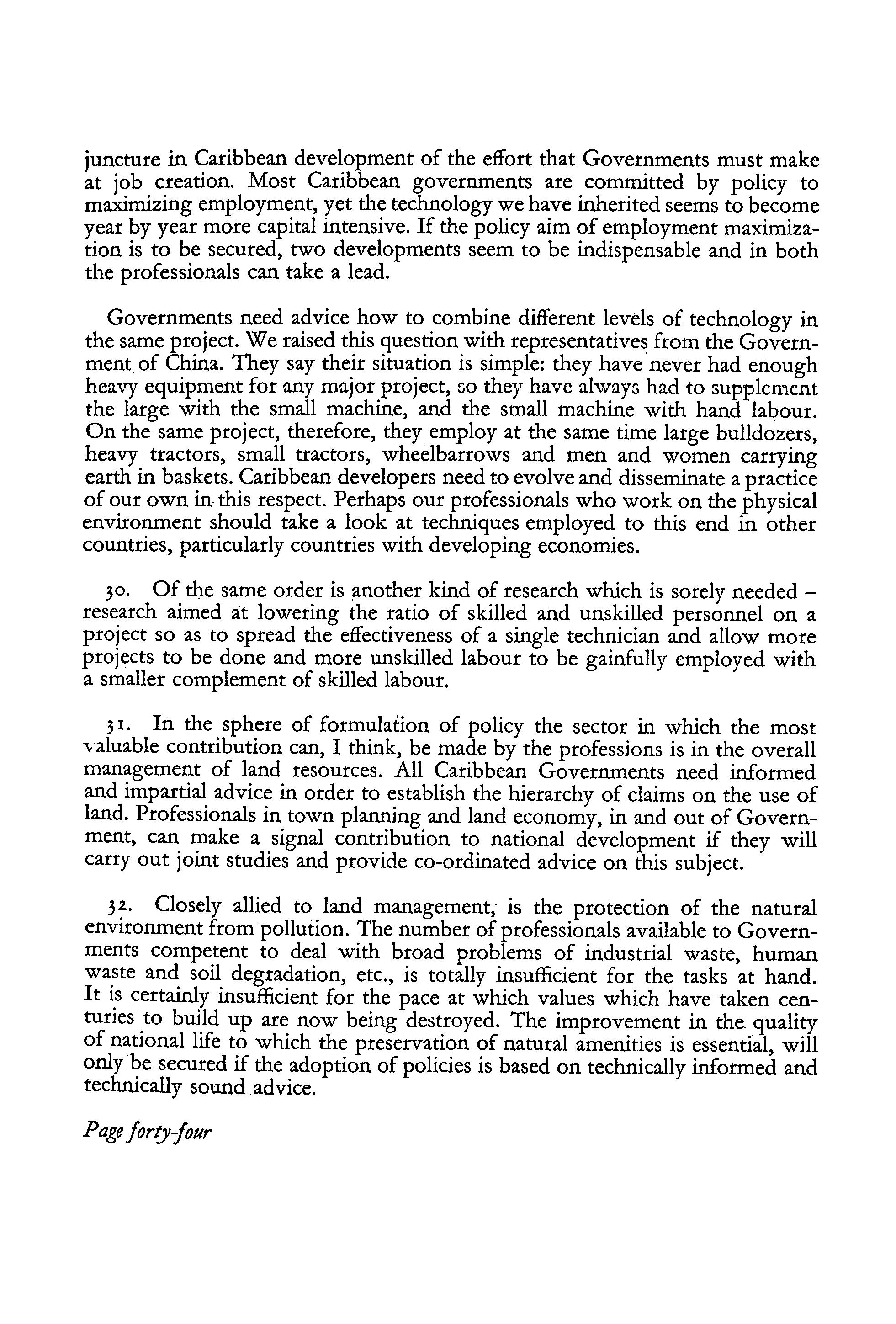
25 minute read
Annex B - Address by Mr W. A. Burke and Mr E. W. Carrington
juncture in Caribbean development of the effort that Governments must make at job creation. Most Caribbean governments are committed by policy to maximizing employment, yet the technology we have inherited seems to become year by year more capital intensive. If the policy aim of employment maximization is to be secured, two developments seem to be indispensable and in both the professionals can take a lead.
Governments need advice how to combine different levels of technology in the same project. We raised this question with representatives from the Government of China. They say their situation is simple: they have never had enough heavy equipment for any major project, so they have always had to supplcmcnt the large with the small machine, and the small machine with hand labour. On the same project, therefore, they employ at the same time large bulldozers, heavy tractors, small tractors, wheelbarrows and men and women carrying earth in baskets. Caribbean developers need to evolve and disseminate a practice of our own in this respect. Perhaps our professionals who work on the physical environment should take a look at techniques employed to this end in other countries, particularly countries with developing economies.
Advertisement
30. Of the same order is another kind of research which is sorely needed - research aimed at lowering the ratio of skilled and unskilled personnel on a project so as to spread the effectiveness of a single technician and allow more projects to be done and more unskilled labour to be gainfully employed with a smaller complement of skilled labour.
i. In the sphere of formulafion of policy the sector in which the most valuable contribution can, I think, be made by the professions is in the overall management of land resources. All Caribbean Governments need informed and impartial advice in order to establish the hierarchy of claims on the use of land. Professionals in town planning and land economy, in and out of Government, can make a signal contribution to national development if they will carry out joint studies and provide co-ordinated advice on this subject. 32. Closely allied to land management; is the protection of the natural environment from pollution. The number of professionals available to Governments competent to deal with broad problems of industrial waste, human waste and soil degradation, etc., is totally insufficient for the tasks at hand. It is certainly insufficient for the pace at which values which have taken centuries to build up are now being destroyed. The improvement in the. quality of national life to which the preservation of natural amenities is essential, will only be secured if the adoption of policies is based on technically informed and technically sound advice. Page fortji-four
CO-OPERATION WITH THE UNIVERSITIES 33- It is scarcely practicable, and I doubt whether it would be desirable, that the major part of .the contribution by the Universities to national development should be made through the Public Service. The Universities will always be wary of too direct involvement in the day-to-day affairs of Government. In any case the quality of national development in the long term is already theirs to determine, for with the growth of nationalism in the region their influence on the choices and standards of higher education will be paramount. 34. As in the case of the professions, however, a substantial measure of co-operation and help to Government Departments is already being provided by the Universities. The help is given for the most part on an individual basis where a particular Professor or member of Faculty serves as adviser to a Minister, consultant to a Ministry or participant in an ad hoc committee or working group. 3. In Engineering Agriculture and Law, the University contributes directly to national development through the professions. The Department of Government and the School of Management have embarked upon major programmes of modernizing Caribbean management and administrative techniques. 36. In the time which remains at my disposal I can do little more than list some of the areas in which it appears to me that the University contribution towards the specific needs of the Public Service can be most effective: (i) Periodic consultation should be organized between Public Service and the University administrations in forecasting manpower needs in the region for development and other purposes. Decisions on the University's own programmes of expansion should be influenced very greatly by such forecasts. (2) We would like to see data maintained and organized about the employment preferences of University graduates and on the movement of Caribbean graduates in and Out of employment in the region. () The Government alway3 has a wide variety of subjects for study and analysis which could, without prejudice to academic independence, offer fields of inquiry for postgraduate and doctoral theses. The opportunity to recommend such fields of inquiry would be very valuable to the Public Service. () The Administrative Staff College, when it is established in Jamaica, will look to the University to provide it with some part of its teaching staff, and certainly to take care of the preliminary preparation which some Staff College students will require
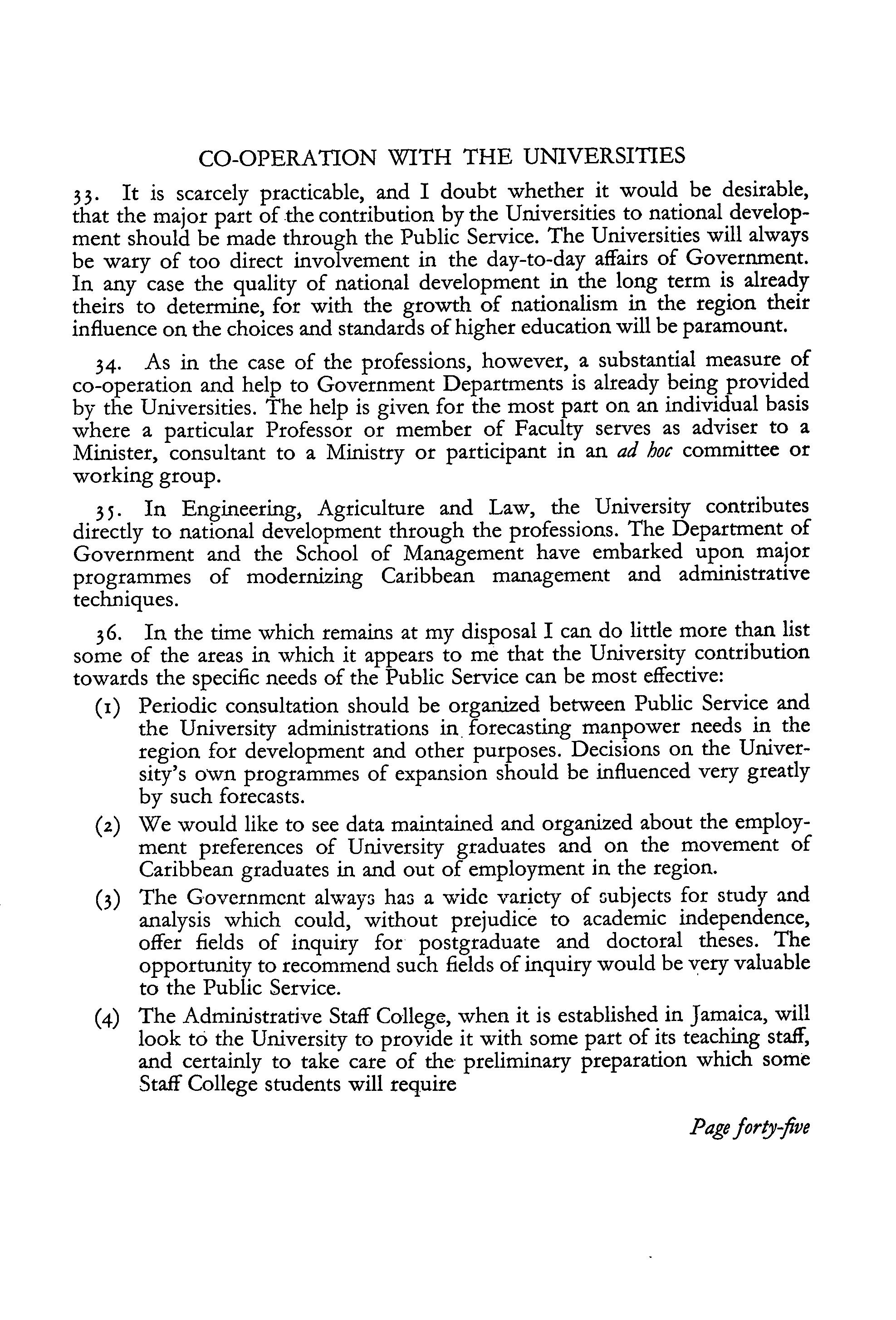
Page fortjv-five
CONCLUSION 37. Mr. Chairman, distinguished Participants, Ladies and Gentlemen, you will certainly have discovered at this point in my address that the widest possible scope still remains for the joint study of means of co-operation between Government, the Professions and the Universities. 38. I am confident that a broad consensus will emerge from our Seminar that permanent machinery for co-operation should be established. I wish you a fruitful, as well as pleasant three days of deliberations.
ANNEX B
MUTUAL INTERACTION FOR ECONOMIC INTEGRATION By Walter A. Burke, Director, General Services and Administration, and Edwin W. Carrington, Director, Trade and Integration Caribbean Community Secretariat
Introduction
I must first apologize for the absence of my colleague and collaborator, Mr Edwin Carrington, Director of the Trade and Integration Division of the Caribbean Community Secretariat. As you are all aware, the countries of the Caribbean along with the African and Pacific partners are at the moment involved in the final leg of negotiations for association with the European Economic Community. Mr Carrington is therefore in Brussels as a member of the Secretariat's delegation at these negotiations. 2. The subject of this paper is one of tremendous interest to all of us in the Secretariat. In many ways the Secretariat may be considered to be the Civil Service of the Regional Movement serving the collective wills of the xz member countries. Naturally we come in contact with all the national Civil Services of the Region; but the role of the Universities and Professions in advancing economic integration is also of great relevance to our operation.

HISTORIC BACKGROUND 3. Economic integration has had a relatively short existence in the Caribbean, the first real steps having been taken less than ten years ago when in December 1965 the Governments of Antigua, Barbados, and Guyana signed an Agreement at Dickenson Bay, Antigua, to set up the Caribbean Free Trade AssociatiOn. In the interest of encouraging wider co-operation among all the Commonwealth Caribbean territories the implementation -of. this. Agreement was,. however, Page forty-six
postponed and eventually Heads of Government of the Commonwealth Caribbean Countries at their Fourth Conference held in Barbados in October 1967 decided to formally establish CARIFTA, .to include as many Comonwealth Caribbean countries as possible in a new Agreement based on the first Agreement which had been signed in 1965. 4. It was further agreed that CARIFTA would be the beginning of what was eventually to be translated into a Caribbean Economic Community. This new Agreement entered into force for the territories of Antigua, Barbados, Guyana and Trinidad and Tobago on May 1st, 1968 and was subsequently adhered to by Dominica, Grenada, St Kitts-Nevis-Anguilla, St Lucia and St Vincent on July ist, 1968, Jamaica and Montserrat on August ist, 1968 and Belize on May 1st, 1971. Bahamas did not join the Association, although it contributed to the budget of the Association's Secretariat. In keeping with the conception of the Fourth Heads of Government . Conference that CARIFTA would in effect be the jumping-off stage for an eventual Caribbean Economic Community (Common Market), the Secretariat was entrusted with undertaking necessary research to devise the required necessary framework on which such forward steps could be taken. These studies revolved around three main areas: ensuring that the LDCs (or perhaps more correctly the More Under Developed Countries of the Region) secured adequate benefits from the Integration Movement; mechanisms for 'deepening' CARIFTA into a Common Market; the implications and timing for 'widening' CARIFTA. 6. These inter-related issues were the subject of several studies which were submitted to Governments over the first four years of CARIFTA and in this connection ready acknowledgement is given to the contribution of the Academics, and in October 1972, Heads of Government of the Commonwealth Caribbean Community at their Seventh Meeting held in Trinidad decided to transform CARIFTA into a Common Market and establish the Caribbean Community of which the Common Market is an integral part. The Common Market is a substantial advance on CARIFTA and constitutes a significant deepening of CARIFTA while providing additional special measures for the benefit of the LDCs. The draft of the Caribbean Community Treaty which encompasses the . operations of the Community was in essence agreed to at the Eighth Heads of Government Conference in Georgetown in April 1973, and came into force for the Governments of Barbados, Guyana, Jamaica and Trinidad and Tobago on August 1st, 1973, the Heads of Government of these countries having Page forty-seven
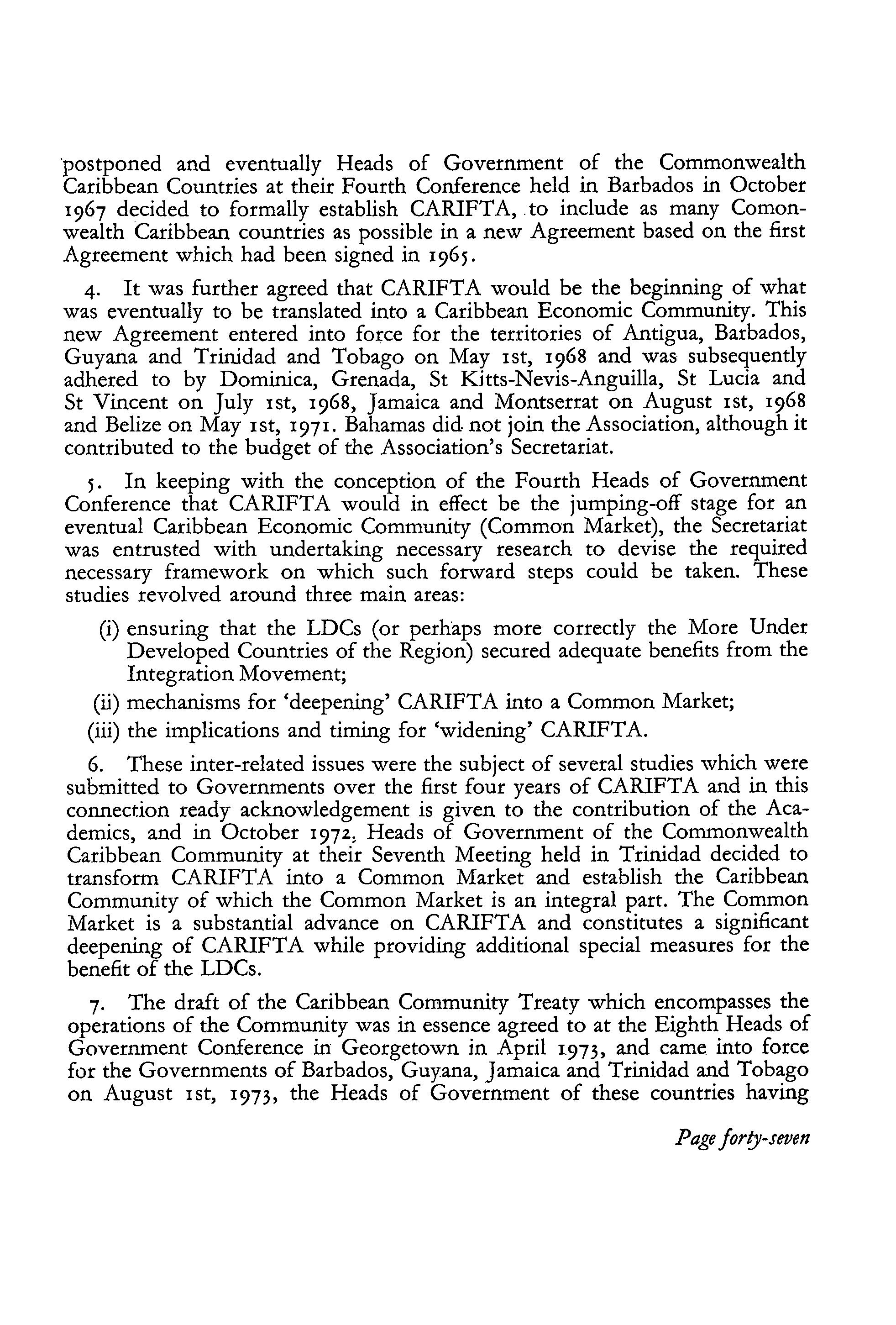
signed the Treaty at an historic meeting in Trinidad on the fourth of the preceding month. 8. All the other Governments who were members of CARIFTA have since signed and ratified the Treaty. Membership in the Community (and Common Market) is therefore now the same as existed in CARIFTA which it has superseded. The Bahamas which never joined CARIFTA has not yet joined the Caribbean Community although it is hoped that she will do so in the near future. On the question of 'widening' the Secretariat is currently carrying out . studies mandated by Heads of Government. These studies relate to a widening which could eventually include all the islands of the Caribbean Sea and Surinam. It may be of interest to note that one non-English speaking territory (Haiti) has already applied for membership in the Common Market.
WHAT DOES ECONOMIC INTEGRATION SEEK TO ACHIEVE? io. Any attempt at discussing the contribution which interaction between elements of the Community can make to economic integration in the Region should, however, have a further point of departure. There ought to be some assessment of what such a movement aims at achieving and indeed what methodology or mechanisms are considered necessary or desirable for procuring these results. First we look at what we hope to achieve. ii. Basically, economic integration aims at ensuring a better quality of life for all members of the Caribbean Community both at national and individual levels. Now, it must be conceded immediately that this cannot be achieved by economic integration alone in its strictest sense. It is for this reason that the Treaty establishing the Caribbean Community embraces such other areas as Common Services, functional co-operation, and co-ordination of Foreign Policy among Independent Territories. Indeed the very nature of zoth-century international politics make this latter a necessary corollary of economic integration. Some latitude is therefore craved where use of the term economic integration in this paper in effect relates to other areas of co-operation covered by the Caribbean Community Treaty. iz. At this stage it is useful to recall that the Commonwealth Caribbean comprises a number of small island states and mainland Guyana each subject to marked under-development and external economic dependence. We therefore need economic integration, first of all to create a wider and. adequately protected regional market so that the process of industrialization and agricultural development can be facilitated. This is provided for through a Common Protective Policy, the most important component of which is the Common External Tariff.
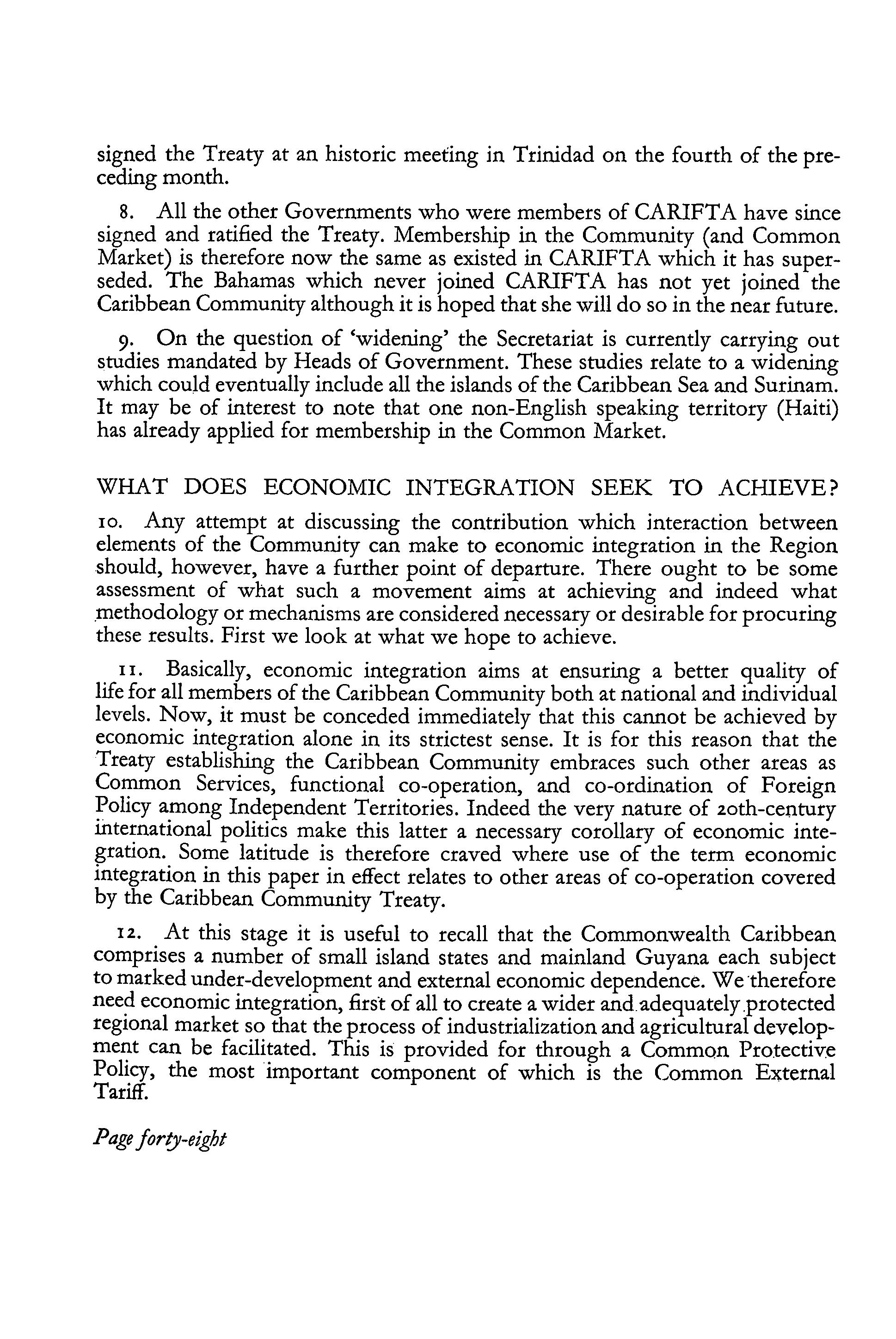
Page forty-ezght
Secondly, economic integration provides for the pooling of our natural resources with a view to achieving the complementary development of our national economies, due care being of course given to the special position of the LDCs. Individual territories differ in endowment of natural resources. It has been shown that pooling of these resources creates additional production possibilities of somewhat greater feasibility than can be achieved on an individual basis. 14. Thirdly, economic. integration will promote the adoption of common policies leading to joint actions by the Region.vis-à-vis. extra-regional . countries and groupings both national and corporate. Common sense indicates that.the Region as a whole has more 'clout' when bargaining externally than any one country in the Community. 1 5 . The achievement of these objectives requires the close co-ordination of national policies and a high degree of joint planning through which the natural resources of the entire Region may be combined to provide a useful basis for some degree (hopefully a high one) of sustained growth for the countries of the Region. If through Regional programming in the agricultural, manufacturing and mineral sectors in the Region, we can create linkages, between the various national economies, we will go a far way towards reducing the need for certain types of extra-regional imports, thus reducing our external dependence. Concommitant with .this is . the need for regional development, of technology. This can .take the form of either the. development of completely indigenous technology or the adaptation of foreign technology to suit the peculiar needs of the Region. Either way, it requires a much fuller development of our human resources. Mention has already been made of the dependent nature of our economies in the Region. A marked feature of this dependence is the extent to which important sectors of these economies are foreign owned and/or controlled. This can prove to be a seriously inhibiting factor in any attempts at co-ordinated planning. Foreign ownership and control of key economic sectors can prevent the creation of a genuine national economy, even though it may produce economic growth in the sense of a rise in total and per capita' income. When a country is dominated by foreign private investment for a long period of time, the effect is to distort development; to fail to produce linkages between economic activities and sectors; to cripple and discourage the development of local initiative, local entrepreneurship and local institutions for mobilizing savings; and to remove from national control powers of effective decision-making in economic matters. iS. Thus, an important element in regional integration strategy is a common policy towards foreign investment, which among other things seeks to
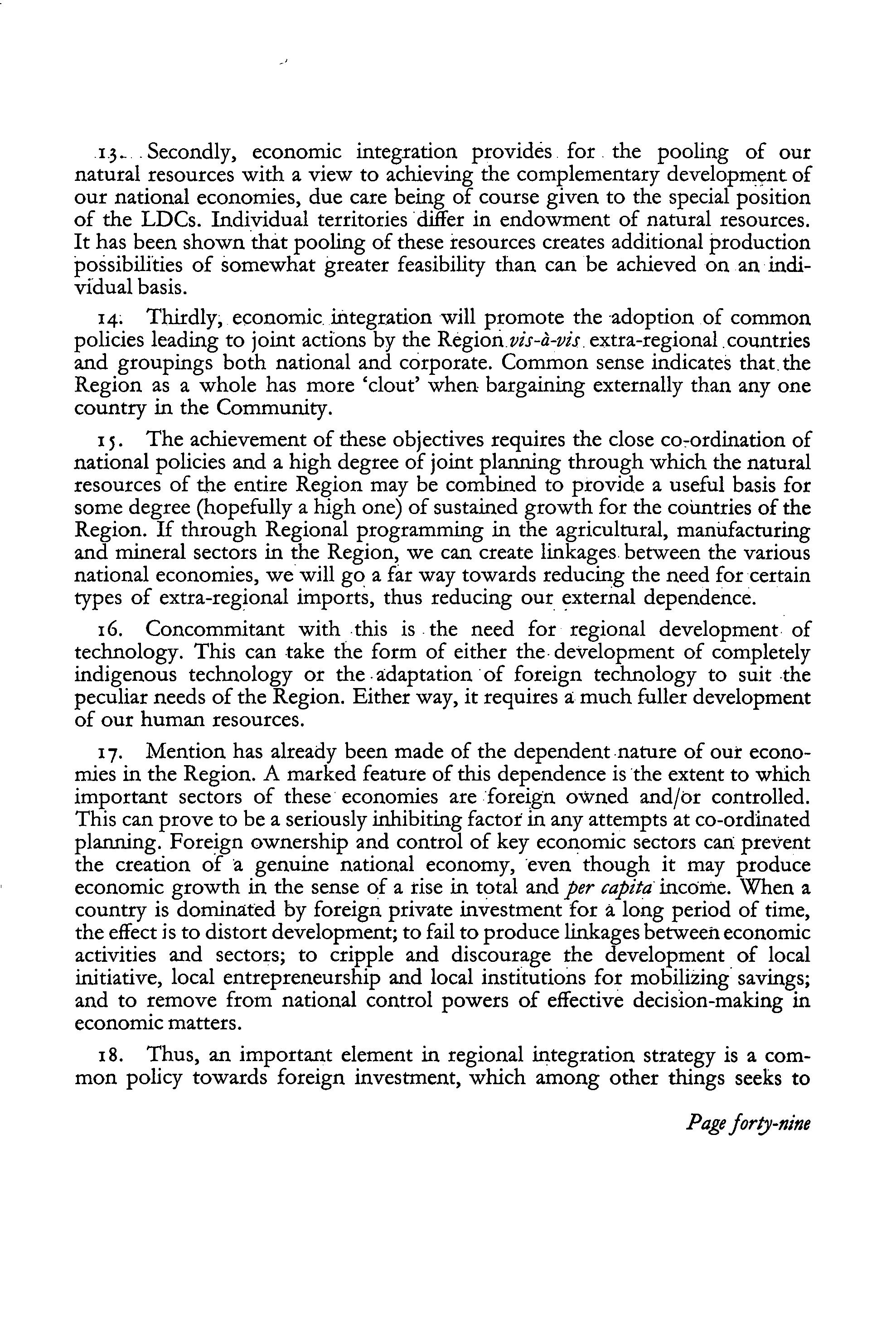
Page fortji-nine
ensure that the gains from an integrated market accrue to nationals rather than foreigners. In summary, economic integration is the vehicle for the overall develop- ment of the economies of the member states in the Community through fuller and more rationalized utilization of all the resources in the entire Region. This will be achieved by the reduction of the various forms of external dependence from which the Region now suffers, the development of co-ordinated policies and the improvement of our bargaining position internationally. This not only calls for some restructuring of the existing institutions, but also for significant changes in attitudes. It should easily be acknowledged that if the restructuring referred to above is to be brought about, Governments must play 'a major role. It-is only Governments which have the competence to embark on co-ordinated policies for sectoral development on a regional level. Governments alone have the capacity for the joint planning which is necessary. In this connection, a comment made by Mr W. G. Demas, former Secretary-General of the Caribbean Community Secretariat, is of interest: 'In restructuring the economies of the Caribbean Countries - as indeed of all Third World Countries, the State must inevitably have a large role to play. The power of the State as an institution must be mobilized and deployed on the external front in order to promote the interest of the country vis-à-vis powerful foreign government and powerful international corporations. It must also be mobilized on the internal front in the interest of general national economic development. . . zi. This is in no way an argument for a centrally planned economy. It simply recognizes the ideal position of Governments for restructuring economies, and indeed their responsibility to their people for doing so. One must however, not lose sight of the potential disadvantage underlying a movement like the Caribbean Community in which there is no supra-national political authority and in which practically all decisions are subject to unanimity. Such a situation demands the highest degree of collaboration and at times even compromise at the national level in the interest of the regional whole - a derogation of formal sovereignty at the national level in the interest of more effective sovereignty for all. 22. Since, however, Governments are elected and are therefore subject to the sovereign will of the people there is also an inherent responsibility for Governments to motivate the people, to use such means as are at their disposal e.g. mass media to educate their individual populations as to the wisdom of

x. W. G. Demas -'Power to the West Indian People'. Address delivered at the soth Annual Delegates Conference of the Guyana Trade Union Congress - Saturday, September zoth, 1971.
Page fifly
their actions at the regional level. It is perhaps in this area that we find the greatest deficiency in the Region. 23. To achieve these ends Governments must utilize all the resources at their disposal. They must know that they can have recourse to any category within the community in furthering their developmental aims. There must in short be mutual interaction.
THE UNIVERSITIES
24. Within the Caribbean the Universities and more specifically the University of the West Indies, have a peculiar contribution to make The University of the West Indies has the distinction of being perhaps the oldest regional body in the Caribbean, and spans the Region, with three campuses and its other university centres catering for approximately 5,000 students and having a staff of somewhat over 600. The excellence of its contribution to the Region is unquestioned. It has over the years produced numbers of graduates of high calibre. In fact, the University of the West Indies, and to a lesser extent the University of Guyana have made significant contributions to Regionalism in another way. Their halls have become the centres in which potential leaders, both political and otherwise, have initially interacted. Exposure to each other's views in those formative years has in no small way contributed to easier dialogue when contemporaries meet later in life. We think it is fair to state also that the Universities in the Region have not been totally unmindful of the need for gearing their programmes to the peculiar needs of the Region. All of the Faculties show evidence of the efforts that are being made to develop curricula and research programmes which are uniquely tailored to the needs of the Region. But are we going far enough, fast enough, to cope with the challenges and demands for a restructuring of the Society alluded to earlier? Are we not still preserving an 'elitist' position in respect of the traditional professions? Are the universities fully accepting their role as motivators for change of attitudes within the Society? There may well be need for the Universities to have a further look at their effectiveness in the Caribbean of today. Some of the traditional academic approaches may no longer be relevant or desirable. Maybe we need to develop
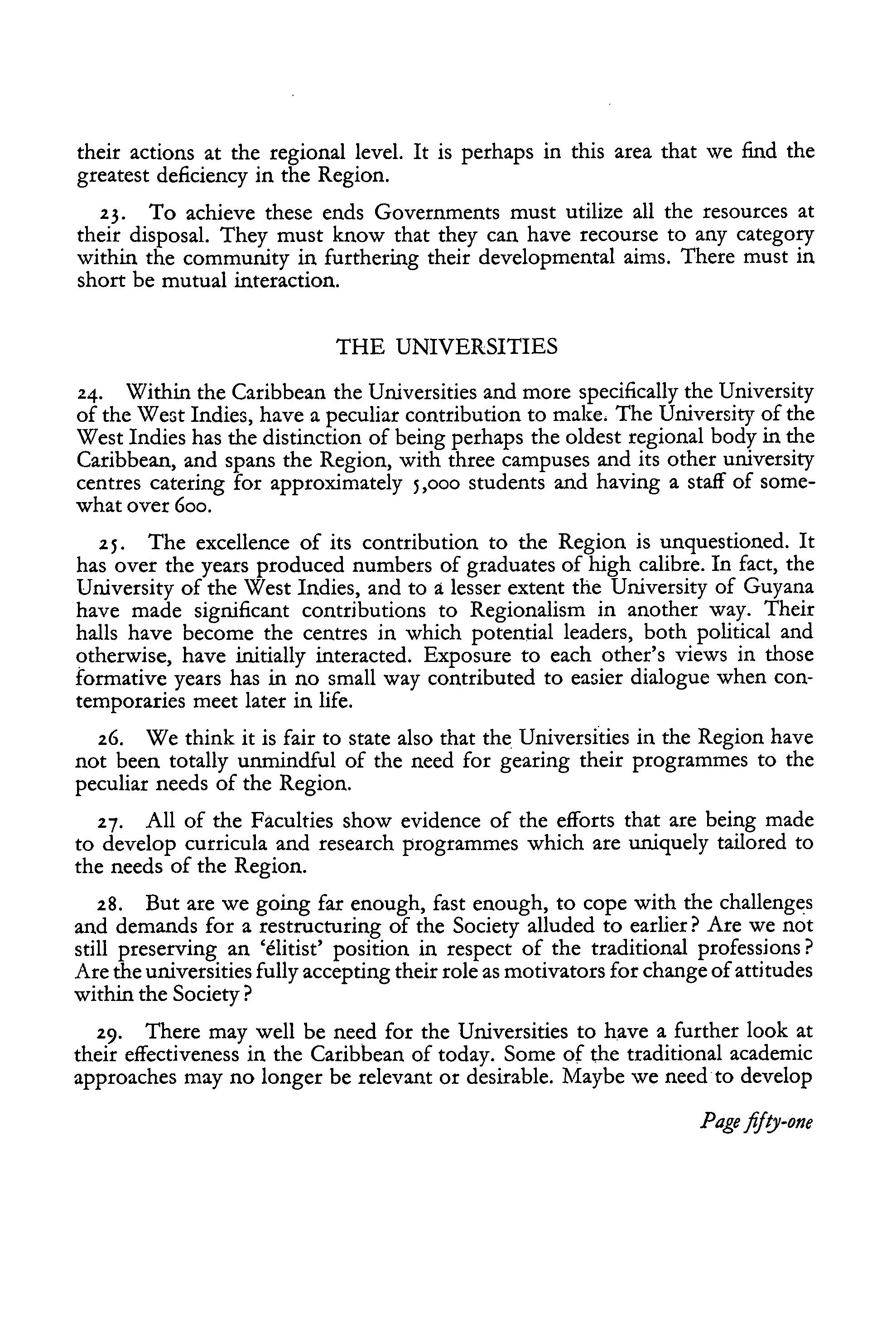
Page fiftjy-one
alternative or ancillary programmes to those which now exist. For instance, is our present medical programme totally relevant? Do we not need to develop within the University larger programmes for the training of para-medicals, or, as it is more euphemistically called, training in Allied Health Sciences? is it worth while producing ten more doctors unless they are combined with say forty para-medicals? 30. Again, do we need more economists at the expense of perhaps a new programme in tourism and hotel management? Can we afford to produce engineers without supporting technicians?
P. Given the scarce financial resources in the Region these are questions which have to be faced squarely, and their solutions depend heavily on the Universities. This is one of the ways in which the Universities can make their contribution to opinion-forming at the national or regional levels. For only by positive reaction to the needs of the society can the Universities hope to play their part in Government's developmental strategies. 32. University education is no longer the prerogative of the privileged few. Academics, therefore, now come into contact with larger sections of the population. They can accordingly also contribute to opinion forming in an indirect way through the residual influence they have on their students who after all, are part (and more often than not a vocal part) of individual national constituencies. There is therefore need for a continuing awareness of the goals of society as expressed through the State if the contribution which the Universities have to make is to be constructive.
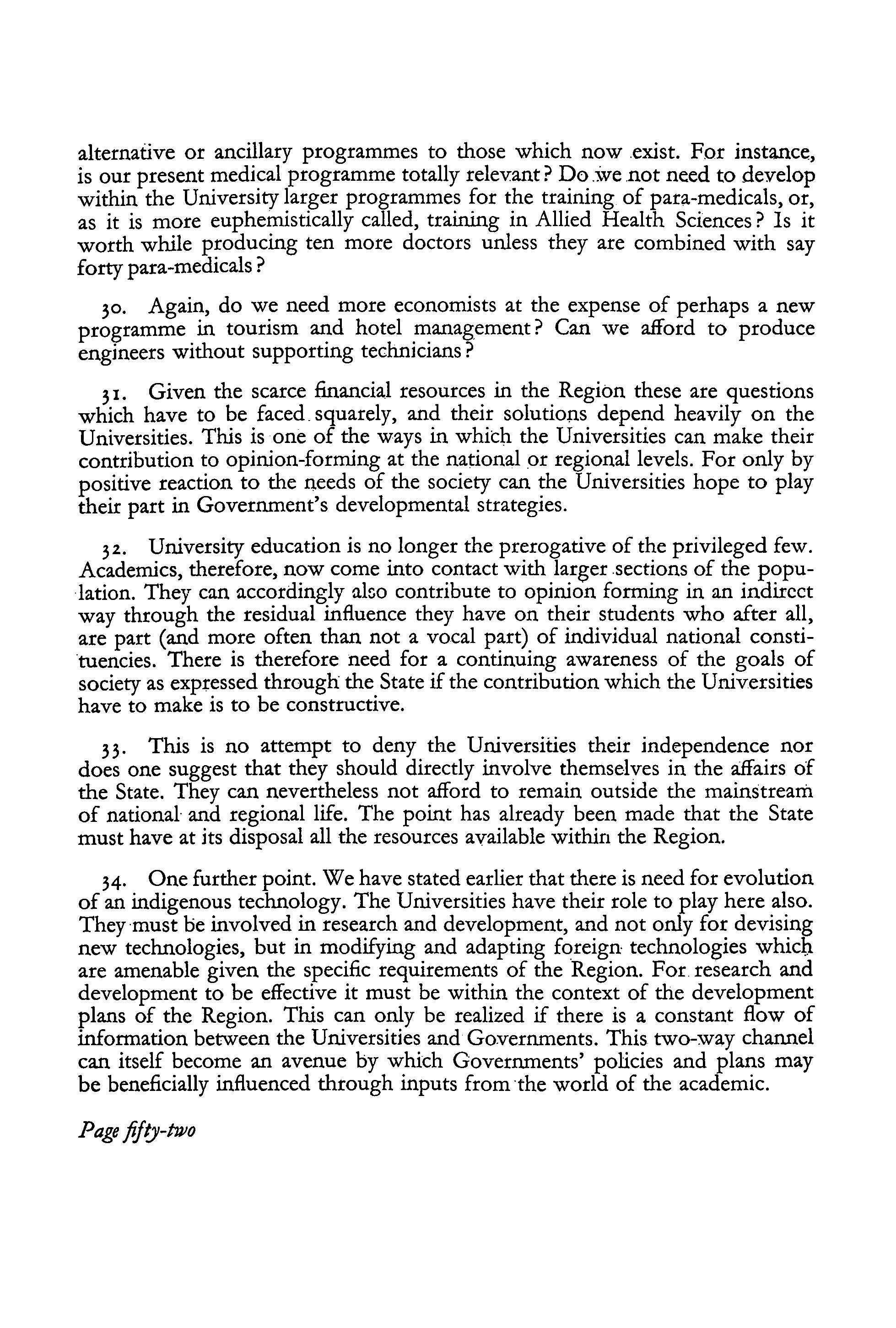
This is no attempt to deny the Universities their independence nor does one suggest that they should directly involve themselves in the affairs of the State. They can nevertheless not afford to remain outside the mainstream of national' and regional life. The point has already been made that the State must have at its disposal all the resources available within the Region. 4. One further point. We have stated earlier that there is need for evolution of an indigenous technology. The Universities have their role to play here also. They 'must be involved in research and development, and not only for devising new technologies, but in modifying and adapting foreign technologies which are amenable given the specific requirements of the Region. For research and development to be effective it must be within the context of the development plans of the Region. This can only be realized if there is a constant flow of information between the Universities and Governments. This two-way channel can itself become an avenue by which Governments' policies and plans may be beneficially influenced through inputs from 'the world of the academic.
Page fiftj'-two
PROFESSIONS 35. In some respects, what has been said of the Universities. may also be said of the professions. Whether consciously or not, they have promoted in air of elitism with regard to the traditional professions. The negative effect that this has had on development within the Region may not be easily measured. One is conscious of it, however. Agriculture as a profession is still not fashionable, yet economists are clearly agreed that any meaningful development either at national or regional level must be underpinned by a sound agricultural base. One also notes the clear line of distinction drawn between the professionals and technicians. One also hears of the restrictive practices within some professions by which the number of aspirants who qualify in any one year is limited. All these factors tend to reduce the effectiveness of the contribution which the professions can make to opinion-forming, and eventually to development. They also tend to distOrt motivation within the community through enhancement of some areas. of academic endeavour at the expense of others. Professionals therefore need to make a conscious effort at improving their public images, perhaps through the establishment and effective operation of professional bodies, demonstrating to the community a professional objectivity and public spirited involvement without which their involvement in matters of public interest can easily be adjudged to be one of self-interest. On the distaff side one is aware of the apparent distrust with which the civil servants tend to view professionals even where in some cases they may be of the same discipline. This is indeed unfortunate because in an area of scarce human and financial resources, Governments are scarcely ever in a position to retain all the professional advice which they need to promote development. They need to rely heavily on the assistance of non-GOvernment professionals and should be able to consult with them and have the benefit of their contributions at all times. One way in which professionals might contribute is in assisting Governments in evolving programmes of training for technicians. Many professionals in the private sector do hold managerial positions in, the private sector and could within their organizations provide for on-the-job training and development at the technical level. These programmes could be developed in consultation with national governments and thus fill a void in the programme of technical education in the Region. Professionals also have another vital, contribution to make to development and indeed :to opinion-forming on a regional basis Their fraternity extends beyond national boundaries and" can asist significantly in. cultivating an atmosphere of receptivity for te,gional programmes and development.
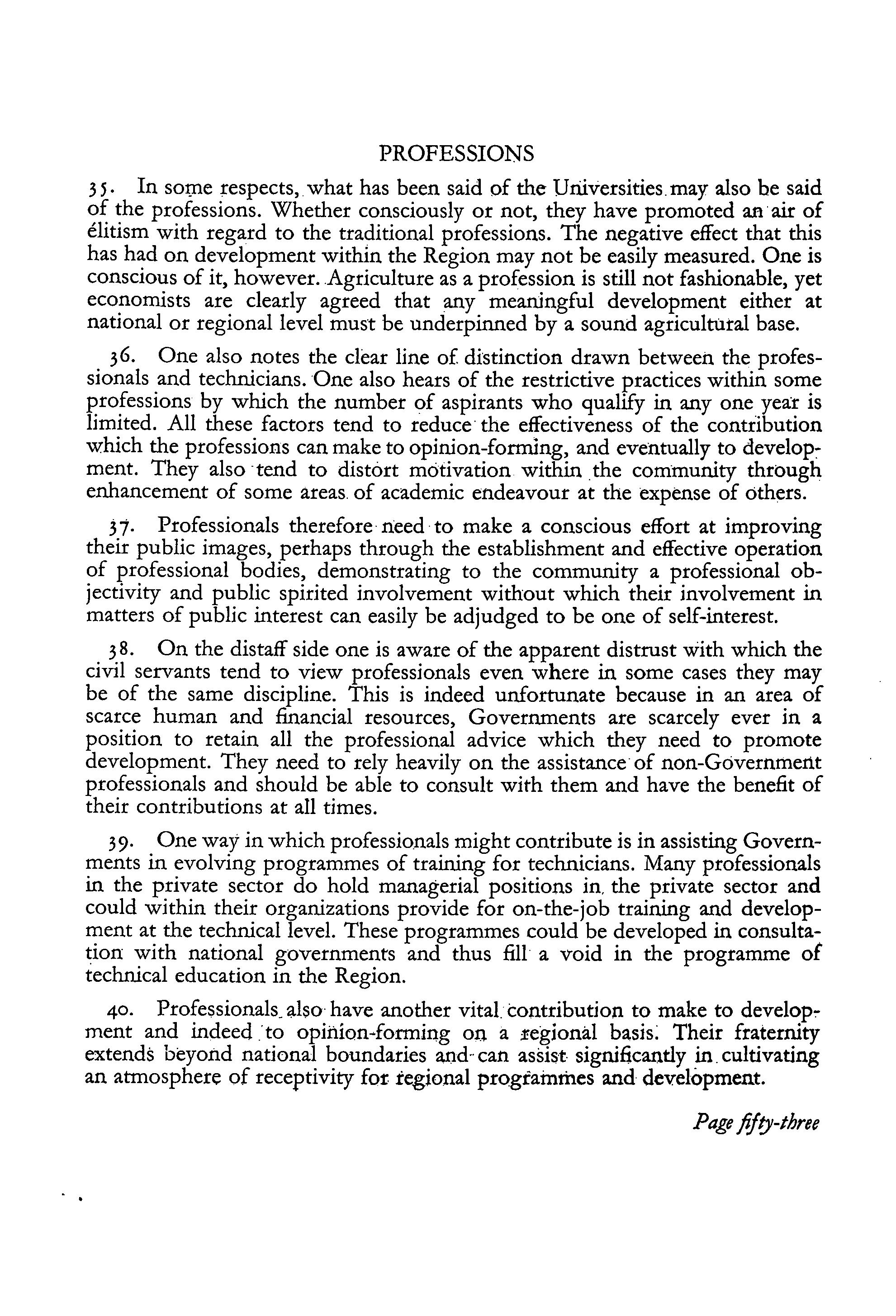
Page fifty-three
CIVIL SERVANTS 41. The role of the Civil Servant is crucial to any discussion on economic integration. 42. In-depth examination of his functions and relationships with Universities and Professions have already been, and will be, treated by other distinguished speakers more competent than ourselves to do so. We should, however, make some mention of their role within the ambit of regional development. 4. Since economic integration aims at the co-ordination and development of joint policies, a heavy responsibility rests with the civil servant at the national level. Not only does he have this traditional role of principal adviser to his Government, and of course that of the conduit for implementation of Government policies, he is also in many respects the propagator of his Government's views at regional level. While obviously required to operate within politically demarcated policy guidelines, he nevertheless in consultation with his counterparts from other national Civil Services is expected to resolve technical difficulties and. roadblocks, thus paving the way for eventual political decisions on matters of joint policy. . The Civil Servant therefore has a dual role - that of interaction with the other elements of society at the national level, as well as 'intra-interaction' with other Civil Servants at the Regional level. 45. We have so far, as it were, looked at the capacity of these functionaries - the academic, the professional and the civil servant - for mutual interaction. The next logical step would appear to be that of examining their scope for Interaction. This will be taken in two sections - the present scope, and possible areas for widening the present scope.
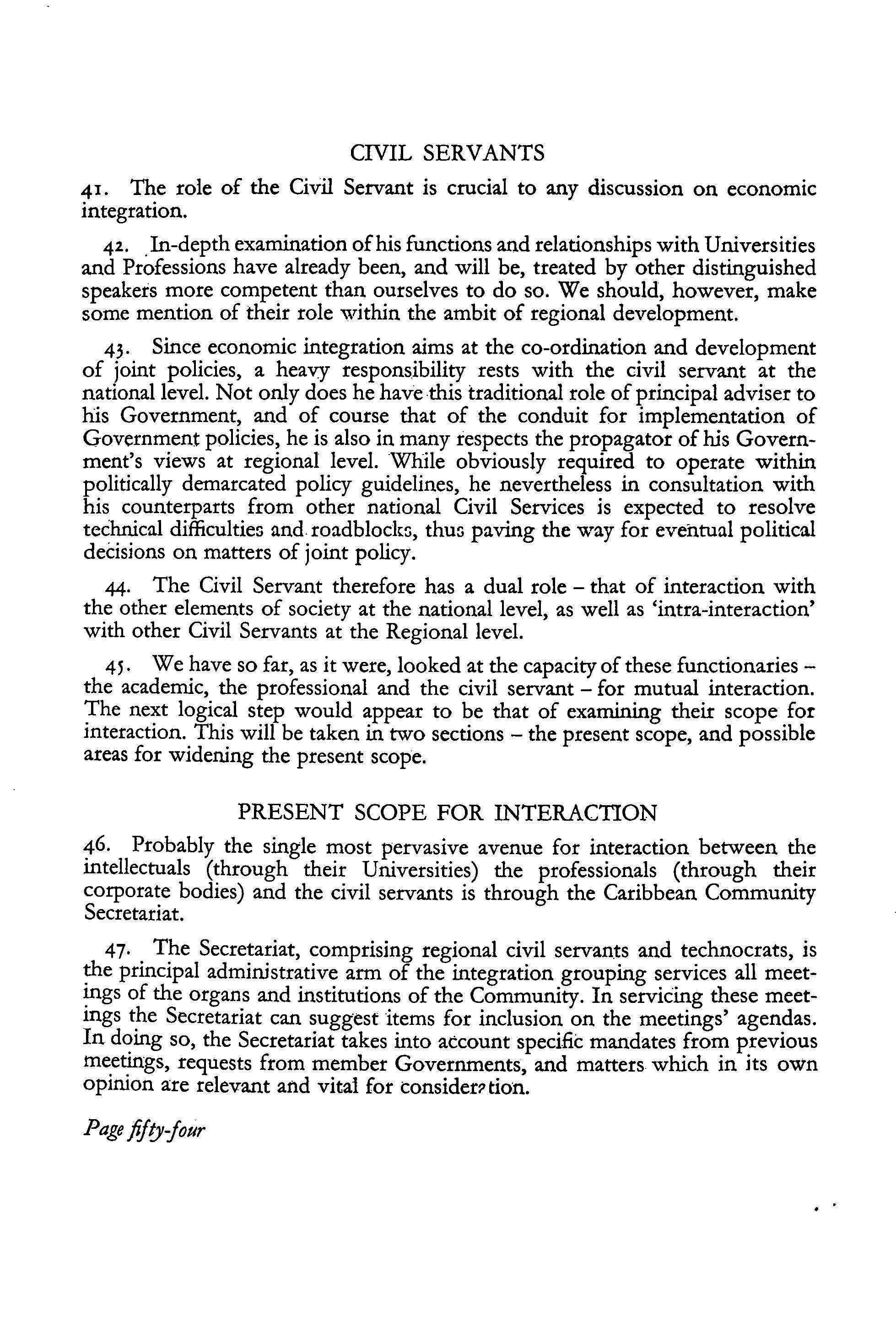
PRESENT SCOPE FOR INTERACTION 46. Probably the single most pervasive avenue for interaction between the intellectuals (through their Universities) the professionals (through their corporate bodies) and the civil servants is through the Caribbean Community Secretariat. 47. The Secretariat, comprising regional civil servants and technocrats, is the principal administrative arm of the integration grouping services all meetings of the organs and institutions of the Community. In servicing these meetings the Secretariat can suggest items for inclusion on the meetings' agendas. In doing so, the Secretariat takes into account specific mandates from previous meetings, requests from member Governments, and matters which in Its own opinion are relevant and vital for consider' tion. Page fifty-Jour
48. The Secretariat is 'open' to any citizen, natural or legal, of the Community. Any professional agency, University, academic organization, etc., can approach the Secretariat with any issue which if in the opinion of the latter is of vital importance, can be placed on the agenda for discussion by the relevant organization or institution of the integration movement. Of course, any of the agencies referred to may also approach any national minister with a view to having him propose the subject-matter for inclusion on the agenda of a meeting of an appropriate organization or institution. 4. The procedure for submitting matters to such meetings involves a preparatory meeting of officials of all member Governments. Thus any submission of the type suggested above which reaches the agenda of a meeting of any organization or institution will have the benefit of examination and recom mendation by officials of the Secretariat and Civil Servants prior to Ministerial decision. 50. While this procedure does provide some opportunity for professional groups to interact with regional officials for the furtherance of national development through the process of regional economic integration, such opportunity is at best minimal, uncertain and unstructured and almost totally dependent on the initiative of the particular professional group. i. Rather more institutionalized arrangements do, however, exist within the economic integration movement with regard to both professional groups and academics. Hence we find that in agriculture both the Departments of Agriculture of the Universities and the Caribbean Agricultural Development and Research Institute (CARDI) are represented at regional meetings thereby providing for the continuous blending of the inputs of the academic/researcher, the practising professional agriculturalists and the national civil servants. 52. Similarly, in the area of monetary co-operation, not only regional officials, but regional commercial and central bankers as well as monetary theorists (academics) interact at different stages and levels in a process of devising policy upwards to a decision-making level by the Ministers of Finance. y3. In the area of regional co-operation in taxation, regional practising tax experts have, both as a professional body (the Caribbean Organization of Tax Administration -- COTA) and as tax officials of member governments, with the assistance of academics in public finance and students of government, conS tributed significantly to the preparation of regional economic integration instruments such as the Intra-Regional Double Taxation Agreements. COTA has also been serving to improve the quality of their membership and to identify areas in which policy needs to be developed and adopted.

Page fiftj-five






